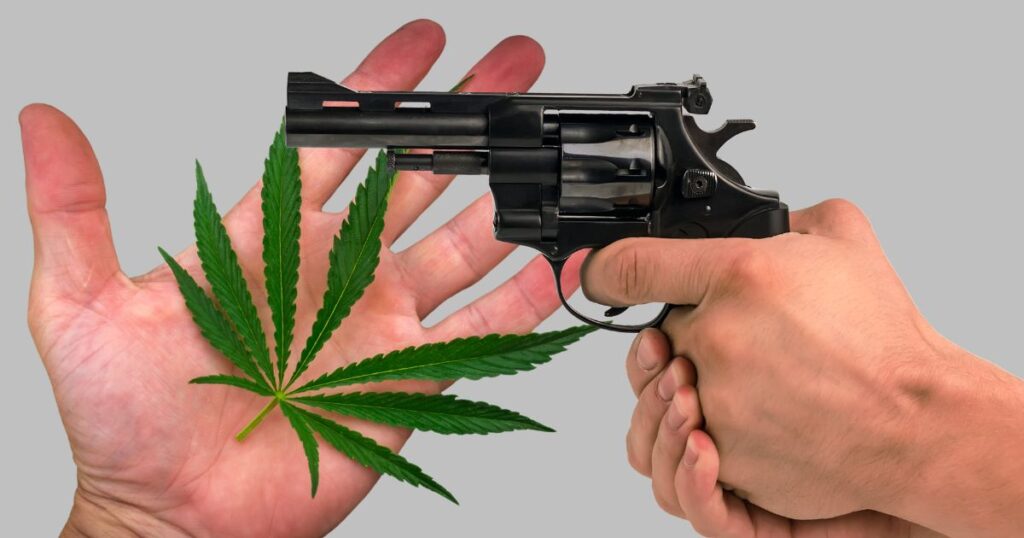The highest court in the land is preparing to tackle a question that affects millions of Americans: Should people who use marijuana be legally prohibited from owning firearms? The Supreme Court recently agreed to hear United States v. Hemani, a case that could reshape federal gun laws at a time when cannabis policy is rapidly evolving across the nation.
This case emerges against a backdrop of dramatic change in marijuana policy. Nearly half of all states have legalized recreational cannabis, while the vast majority have established medical marijuana programs. Yet federal law continues to treat marijuana users as criminals when it comes to gun ownership, creating a legal paradox that leaves law-abiding citizens in limbo.
The stakes couldn’t be higher, we’re talking about a law that could technically criminalize millions of gun owners. The case forces us to confront a fundamental question: In an era where marijuana use has become mainstream and widely accepted for medical purposes, do our federal gun laws reflect modern reality?
United States V. Hemani
Ali Daniel Hemani found himself at the center of this constitutional debate when FBI agents searched his Texas home and discovered a Glock 9mm pistol alongside 60 grams of marijuana and 4.7 grams of cocaine. Federal prosecutors charged him under a law that prohibits anyone who uses illegal drugs from possessing firearms.
But Hemani fought back, and U.S. District Judge Amos Mazzant agreed to dismiss the marijuana-related charges. The judge relied on a 2023 decision from the U.S. Court of Appeals for the 5th Circuit, which had previously invalidated a similar conviction. The appellate court ruled that the government cannot simply allege someone is a regular drug user—they must prove the person was actually under the influence at the time of arrest.
The 5th Circuit’s reasoning reflects a growing recognition that occasional or past marijuana use shouldn’t permanently strip someone of their Second Amendment rights. This acknowledges the difference between being impaired while handling firearms and simply being someone who has used cannabis.
A Patchwork of Contradictory Laws
The federal prohibition on gun ownership for drug users creates an impossible situation for millions of Americans. Consider a military veteran in a state where medical marijuana is legal and uses it to treat PTSD. That same person could face federal felony charges for owning a hunting rifle passed down from their grandfather.
This contradiction becomes even more relevant when we consider that the law doesn’t apply the same restrictions to alcohol users. Someone can legally own firearms while being a regular drinker, even though alcohol impairment causes thousands of deaths annually. The inconsistency reveals the outdated nature of current federal drug policy.
State-level marijuana legalization has accelerated dramatically over the past decade. Medical cannabis programs now operate in dozens of states, serving patients with conditions ranging from epilepsy to chronic pain. Recreational programs have expanded to nearly half the country, treating marijuana more like alcohol than a dangerous controlled substance.
The Government’s Outdated Arguments
Federal prosecutors defending the law argue that habitual drug users with firearms present “unique dangers to society.” They claim the restriction represents a “modest, modern analogue of much harsher founding-era restrictions on habitual drunkards” and fits within the nation’s historical tradition of firearms regulation.
But this argument falls apart under scrutiny. Historical restrictions targeted people who were actively intoxicated, not those who might drink regularly. The founding fathers certainly wouldn’t have recognized a distinction between someone who drinks wine with dinner versus someone who uses cannabis for medical purposes.
The government’s position also ignores the medical reality of modern marijuana use. Cannabis serves as a legitimate treatment for numerous conditions, prescribed by doctors and regulated by state health departments. Treating medical marijuana patients as inherently dangerous gun owners contradicts both scientific evidence and common sense.
The Real Dangers of Prohibition
Current federal law doesn’t just criminalize marijuana users who own guns—it forces them into impossible choices. Medical marijuana patients must either forgo their prescribed treatment or give up their constitutional rights. Veterans suffering from PTSD face prosecution for using the medicine their doctors recommend while maintaining their Second Amendment freedoms.
This prohibition also creates perverse incentives. Someone struggling with opioid addiction faces no federal gun restrictions, despite the well-documented dangers of impairment from prescription painkillers. Meanwhile, a cancer patient using marijuana to manage chemotherapy side effects could face felony charges for owning a firearm for home protection.
Federal law Section 922(g)(3) which is the center of contention for multiple cases of marijuana users and gun owners, the federal statute that prohibits the possession of firearms by a person who “is an unlawful user of or addicted to any controlled substance,” broad language creates additional problems.
It applies to anyone who uses illegal drugs, regardless of frequency, quantity, or impairment level. Someone who tried marijuana once at a party years ago technically falls under the same restrictions as someone with a serious substance abuse problem.
A Constitutional Framework for Change
The Supreme Court’s 2022 decision in New York State Rifle & Pistol Association v. Bruen established that firearm restrictions must have strong historical grounding to survive constitutional scrutiny. This works against blanket prohibitions on marijuana users, since historical gun laws targeted active intoxication rather than past or occasional use.
Hemani’s legal team make this point, arguing that “history and tradition showed laws banning carrying weapons while under the influence of alcohol, but none barred gun possession by regular drinkers.” The same logic should apply to marijuana users—actual impairment matters, not past or potential use.
This becomes even clearer when we consider that marijuana prohibition itself lacks strong historical foundation. Cannabis remained legal in most of the United States until the 20th century, well after the Second Amendment was ratified. Founding-era Americans would have found it bizarre to permanently disarm someone for using a plant they could legally grow in their gardens.
Time for Legal Reality to Match Social Reality
The disconnect between federal prohibition and state-level acceptance creates unnecessary legal jeopardy for millions of Americans. Cannabis has become normalized in much of the country, used by teachers, police officers, business owners, and military veterans. These law-abiding citizens shouldn’t face federal prosecution for exercising their Second Amendment rights.
Medical marijuana patients deserve particular protection. These individuals use cannabis under doctor supervision, often for serious medical conditions. Treating them as dangerous criminals while allowing unrestricted gun ownership for users of far more impairing prescription drugs makes no scientific or legal sense.
The economic reality also demands change. Legal cannabis has become a billion-dollar industry, employing hundreds of thousands of Americans and generating substantial tax revenue for states. Many of these industry professionals—from security guards to business owners—need firearms as part of their legitimate work.
Beyond Federal Overreach
The decision of the Supreme Court to hear Hemani case represents more than just drug policy—it’s about federal overreach into areas traditionally governed by states. When states legalize marijuana through democratic processes, federal laws that criminalize those same citizens create constitutional tensions that demand resolution.
States have taken the lead on sensible cannabis policy, recognizing that marijuana poses fewer risks than alcohol while offering legitimate medical benefits. Federal gun laws should reflect this reality rather than perpetuating outdated prohibitions that serve no public safety purpose.
The Supreme Court’s decision in United States v. Hemani could reshape American drug and gun policy for generations. A ruling that requires proof of actual impairment rather than past or occasional use would restore constitutional balance while protecting public safety.
This case offers a chance to modernize federal law for the 21st century. Cannabis policy has evolved dramatically, with medical programs serving millions of patients and recreational programs operating successfully in numerous states. Federal gun laws should reflect this new reality rather than clinging to prohibition-era thinking.
If federal authorities can strip constitutional rights based on state-legal behavior, where does that power end? The Supreme Court has a responsibility to prevent such overreach while maintaining appropriate safety measures.
Americans deserve laws that make sense—ones that target actual dangers rather than criminalizing behavior that states have democratically chosen to allow. The time has come for federal gun laws to catch up with the reality of modern cannabis policy and respect both the Second Amendment and state sovereignty.





















